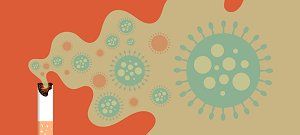World No Tobacco Day
Press Release (28/05/2021)
The health crisis is a good opportunity to stop smoking.
On the occasion of World No Tobacco Day the Jules Bordet Institute is making the connection between Covid-19 and stopping smoking
 Brussels, 28 May 2021 – For more than a year now Covid-19 has disrupted our lives, jeopardising our health, limiting our social contacts, interfering with our day-to-day lives and changing our way of working. Yet the coronavirus could have a positive impact on smokers. What if this time of health crisis was the right time to stop smoking? Martial Bodo, tobacco addiction specialist at the Jules Bordet Institute, explains the links between smoking and Covid-19 and why this crisis is the right time to rid ourselves of the addiction.
Brussels, 28 May 2021 – For more than a year now Covid-19 has disrupted our lives, jeopardising our health, limiting our social contacts, interfering with our day-to-day lives and changing our way of working. Yet the coronavirus could have a positive impact on smokers. What if this time of health crisis was the right time to stop smoking? Martial Bodo, tobacco addiction specialist at the Jules Bordet Institute, explains the links between smoking and Covid-19 and why this crisis is the right time to rid ourselves of the addiction.
"Smokers have a reduced risk of developing serious forms of the disease" False!
At the start of the pandemic there were a lot of reports suggesting that due to the effect of nicotine smokers were better protected against Covid-19.
In truth, smoking reduces lung capacity and makes the smoker more vulnerable to respiratory infections in general. Covid-19 is a disease that principally affects the lungs and respiratory channels. Smoking reduces the body's ability to defend itself against respiratory diseases, coronavirus included. In addition to respiratory problems, smoking causes serious cardiac, cardio-vascular and circulatory problems as well as a whole series of cancers (of the lung, tongue and throat for example). It is having a healthy immune system that gives you the best possible chance of defending yourself against Covid-19.
The possible protective effects of nicotine against Covid-19 have never been proven. Nicotine, present in tobacco but also in electronic cigarettes with a nicotine refill, is a drug that induces dependency. Its consumption is not something to be taken lightly.
Never forget that smoking kills about 17,000 people every year in Belgium, which is 47 a day. A figure that does not include all those who develop comorbidities due to serious smoking-related illnesses.
A special period conducive to stopping smoking.
This period of confinement can be the opportunity to stop smoking. If nothing else, Covid-19 has focused minds on health. We have become acutely aware of just how fragile health can be and of the need to look ourselves. Wearing a mask has become the norm to protect ourselves. Taking it off to smoke removes this protection.
"This period creates a sense of lost freedoms. Freeing oneself from the slavery imposed by tobacco dependency is, on the other hand, the acquisition of a new freedom," explains Martial Bodo.
The coronavirus has totally upset our day-to-day life and routines, with fewer social contacts, less travelling and in many cases telework. These changes all impact on our smoking habits. For smokers who were used to smoking at particular moments in the day this can be an opportunity to stop. We are also spending more time at home. Stopping smoking also means no longer imposing passive smoking on other members of our household.
This period can be seen as one that can provide a stimulus for breaking with old habits and creating new, healthier routines.
A team of professionals fully dedicated to supporting smokers.
At the Jules Border Institute a team of tobacco addiction specialists accompanies and supports all those who want to take steps to stop smoking. Consultations are at the Institute's screening clinic. You do not need to be a hospital patient and the service is open to all and the first eight consultations are fully reimbursed by your health insurance. Consultations are in French, Dutch or English.
Go to the Jules Bordet Institute website to find out more about the CAF, the Help Centre for Smokers: https://www.bordet.be/en/practical-informations
- Press contact (Institut Jules Bordet)
- Martial Bodo
- GSM : +32 497 108 100
- Email : martial.bodo@bordet.be ou martial.bodo@gmail.com
- Martial Bodo